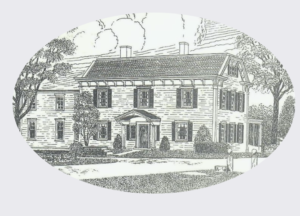Biggest Fish sues to defeat American Revolution landmark in Tuckahoe
A Bronxville business is trying to reverse a decision to designate a Revolutionary War-era house in Tuckahoe as a landmark.
Biggest Fish Westchester petitioned Westchester Supreme Court on Dec. 5 to declare that Ward House on White Plains Road is not a landmark.

The property has been “run into the ground as a college dorm for over a quarter century,” according to the petition, and any history it once had is “no longer recognizable or palpable.”
But this past August the Friends of the Ward House Inc. persuaded village trustees that the 230-year-old house has played a significant role in the cultural and social history of the village, as a home of prominent citizens, a hub of Revolutionary War activities, stagecoach stop, post office, tavern and religious meeting place.
The trustees and Friends of the Ward House are named as defendants in the case.
Biggest Fish, operated by Gregory Holcombe of Bronxville, paid Concordia College $651,000 for the property in August 2021, according to the deed.
Shortly after the Ward House deal was struck, the village enacted an historic preservation law, the petition states, and established the Historic Preservation Commission.
A property can be designated as a landmark if it represents the village’s cultural, architectural, social or economic history. If a property was the birthplace or burial place of an historical figure, for example, or could be useful in the study of history it qualifies.
Last February, Friends of the Ward House nominated the property for landmark status.
The house was built sometime before 1754, according to the application. It was occupied during the Revolutionary War by both patriots and British loyalists, and the British eventually destroyed it.

“Few, if any, Westchester homes preserve the story of the creation of the American nation as does Ward House,” the application states. “The site encapsulates the armed struggle, suffering and political divisions during the American Revolution. … Six founding fathers of the United States are in some way connected with the Ward House.”
A new house was built to the original specification sometime between 1778 and 1797.
In 1850, when the house was known as Marble Hall, a Catholic mass was celebrated there for the Irish immigrants who worked in the Tuckahoe marble quarries.
In the mid-1940s, Concordia College bought the property. It sold Ward House last year as it was shutting down and selling its main campus to Iona College, now known as Iona University.
The Historic Preservation Commission endorsed landmark status this past June, and on Aug. 8 the board of trustees made it official.
The implications for Biggest Fish are significant. Alterations, demolition and new construction are restricted, according to the complaint, and the Historic Preservation Commission “can dictate and direct with extreme detail how and whether work may be performed on the landmarked property.”
Biggest Fish, whose plans for the property are not disclosed in the petition, claims that the house is dilapidated, unsafe and non-functional. It says the preservation group’s facts are “dubious, vague or marginal” and support only that the house is old.
It also claims that the approval process was flawed. Only the property owner — in this case, Biggest Fish — or the Historic Preservation Commission can commence a landmark application, the petition states. Friends of the Ward House did not have a right to start the process.
Then the board of trustees allegedly acted hastily. Friends of the Ward House representatives were allowed to speak at a hearing, but when an attorney for Biggest Fish asked for an adjournment to allow more time to prepare, the trustees rejected the request and adopted the landmark resolution.
Biggest Fish attorneys David S. Steinmetz and Lee J. Lefkowitz argue that the trustees abused their discretion and violated village’s procedures. They are asking the court to annul the landmark resolution.
Neither village attorney Gary R. Gjertsen nor an officer of the Friends replied to emails asking for their side of the story.